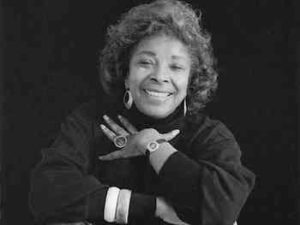
Rosa Guy
*Rosa Guy was born on this date in 1922. She was a Black playwright and writer.
Rosa Cuthbert was born in Diego Martin, Trinidad. She and her younger sister Ameze were left with relatives when their parents, Audrey and Henry Cuthbert, emigrated to the United States in 1927. The children did not join their parents in Harlem, New York, until 1932. Their mother became ill the following year, and Rosa and her sister were sent to Brooklyn to live with a cousin.
The cousin's Garveyism and black nationalistic politics deeply affected Rosa. After their mother died in 1934, the two girls returned to Harlem to live with their father, who remarried. When their father died in 1937, the orphaned girls were taken into the welfare system and lived in foster homes. Rosa left school at 14 and worked in a garment factory to support herself and her sister.
In 1941, at 19, Rosa met and married Warner Guy. While her husband served in the Second World War, she worked in the factory. A co-worker introduced her to the American Negro Theatre, where she studied acting. In 1942, her son Warner Guy, Jr, was born. After the war, she her husband and soon moved to Connecticut. She and her husband divorced in 1947
Writers' community
In 1950, along with novelist John Oliver Killens, Guy formed a workshop to become the Harlem Writers Guild (HWG). The Guild nurtured more than half of all successful Black writers between 1950 and 1971. Guy also belonged to On Guard for Freedom, a Black nationalist literary organization founded by Calvin Hicks on the Lower East Side of New York City. On Guard was active in the political realm, supporting Congolese liberation leader Patrice Lumumba and protesting the United States-sponsored Bay of Pigs invasion in Cuba.
In 1954, Guy wrote and performed in her first play, Venetian Blinds, which was successfully produced Off-Broadway at the Tropical Theater. Two stories by Guy, "Magnify" and "Carnival," appeared in the Trinidad Nation newspaper in 1965. Her first novel, Bird at My Window, was published the following year.
After Martin Luther King's assassination in 1968, she set out to record the voices of young black Americans in a 1970 documentary work entitled Children of Longing. This work contains first-hand accounts of the experiences and aspirations of young people "growing up in a hostile world ."She traveled in the Caribbean, living in Haiti and Trinidad for a while.
Most of Guy's books are about the dependability of family members and friends who care for and love each other. Her trilogy of novels for young people, The Friends (1973), Ruby (1976), and Edith Jackson (1978), is based on her own experiences, as well as those of many young African Americans growing up in New York City with little or no money or support from family. Ruby tells the story of a young girl seeking love and friendship who finds it in Daphne Duprey, allowing both girls a new insight into relationships and love.
Guy's 1985 novel My Love, My Love: Or, The Peasant Girl has been described as a Caribbean retelling of Hans Christian Andersen's "The Little Mermaid "with a dash of Shakespeare's Romeo and Juliet. Concepts of sacrifice and pure love reign throughout the novel. Lynn Ahrens and Stephen Flaherty adapted it for the Broadway musical Once on This Island, which won the 2018 Tony Award for Best Revival of a Musical.
Rosa Guy died of cancer on June 3, 2012, at her home on the Upper West Side of Manhattan, aged 89. Her obituary was included in The Socialite Who Killed a Nazi with Her Bare Hands: And 144 Other Fascinating People Who Died This Year, a collection of New York Times obituaries published in 2012.